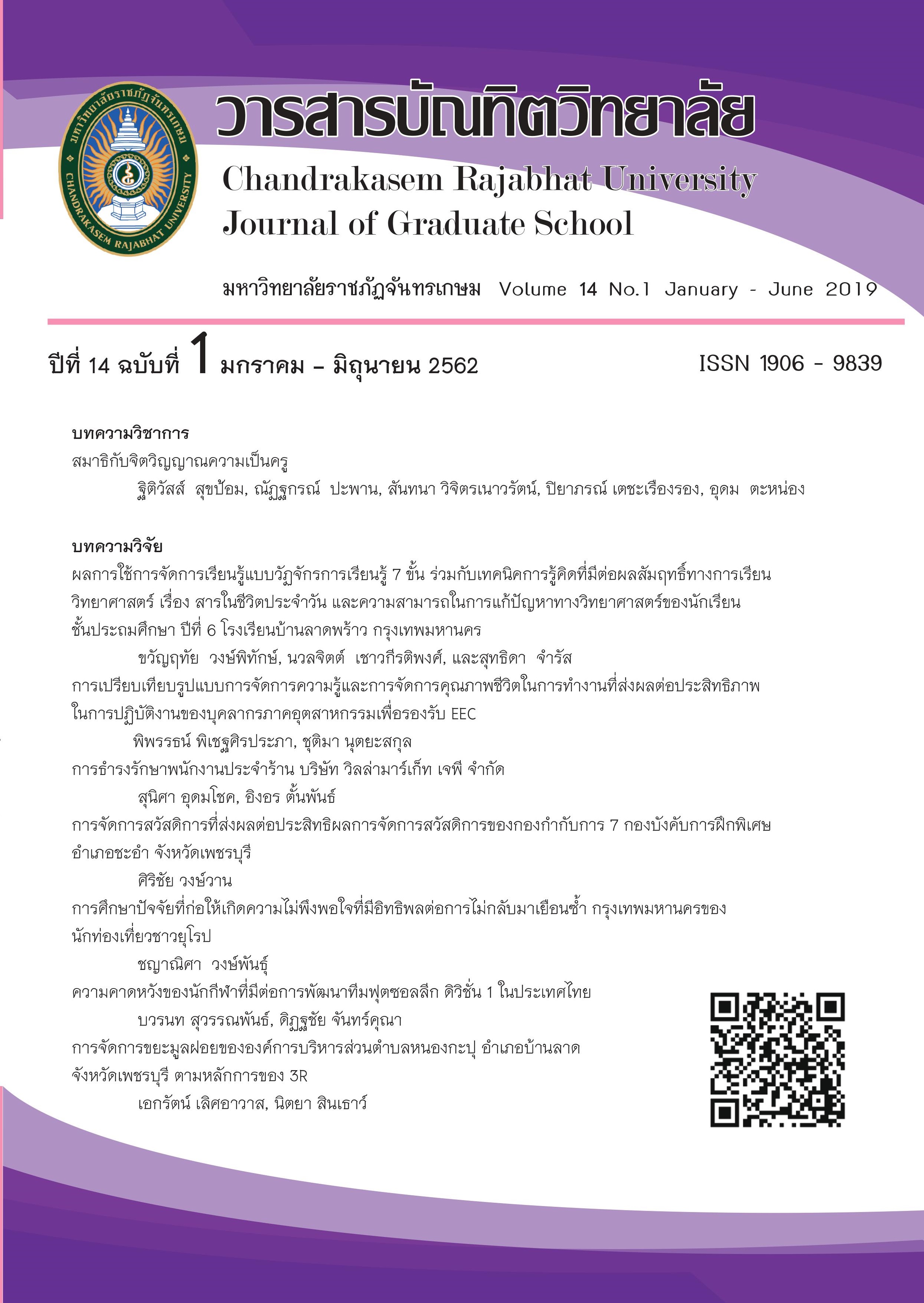การเปรียบเทียบรูปแบบการจัดการความรู้และการจัดการคุณภาพชีวิตในการทำงานที่ส่งผลต่อประสิทธิภาพในการปฏิบัติงานของบุคลากรภาคอุตสาหกรรมเพื่อรองรับ EEC
Main Article Content
บทคัดย่อ
การวิจัยครั้งนี้มีวัตถุประสงค์ (1) เพื่อศึกษาการเปรียบเทียบรูปแบบการจัดการความรู้ที่ส่งผลต่อประสิทธิภาพในการปฏิบัติงานของบุคลากรภาคอุตสาหกรรมเพื่อรองรับ EEC (2) เพื่อศึกษาการเปรียบเทียบรูปแบบการจัดการคุณภาพชีวิตในการทำงานที่ส่งผลต่อประสิทธิภาพในการปฏิบัติงานของบุคลากรภาคอุตสาหกรรมเพื่อรองรับ EEC และ (3) เพื่อศึกษาความสัมพันธ์ของการเปรียบเทียบรูปแบบการจัดการความรู้และการจัดการคุณภาพชีวิตในการทำงานที่ส่งผลต่อประสิทธิภาพในการปฏิบัติงานของบุคลากรภาคอุตสาหกรรมเพื่อรองรับ EEC โดยทำการศึกษากลุ่มตัวอย่างของภาคอุตสาหกรรมเครื่องใช้ไฟฟ้าจำนวน 200 คนและภาคอุตสาหกรรมผลิตชิ้นส่วนยานยนต์จำนวน 200 คน เครื่องมือที่ใช้ในการวิจัยเป็นแบบสอบถามวิเคราะห์ด้วยค่าร้อยละ ค่าเฉลี่ย ค่าเบี่ยงเบนมาตรฐาน และการวิเคราะห์ตัวแบบถดถอยพหุคูณด้วยโปรแกรมสำเร็จรูป ผลการวิจัยพบว่า 1. ด้านการจัดการความรู้ที่ส่งผลต่อประสิทธิภาพในการปฏิบัติงานนั้นภาคอุตสาหกรรมเครื่องใช้ไฟฟ้าและภาคอุตสาหกรรมผลิตชิ้นส่วนยานยนต์ อยู่ในระดับมาก ผลการวิเคราะห์สถิติถดถอยพหุคูณพบว่าภาคอุตสาหกรรมเครื่องใช้ไฟฟ้าเท่ากับ r=0.571 และภาคอุตสาหกรรมผลิตชิ้นส่วนยานยนต์ เท่ากับ r= 0.695 ซึ่งมีความเห็นในทิศทางเดียวกัน โดยให้ความสำคัญกับการแสวงหาความรู้ การเข้าถึงข้อมูลและการจัดการระบบความรู้ให้ได้มาตรฐานตามที่องค์การกำหนดไว้ 2. ด้านการจัดการคุณภาพชีวิตในการทำงานส่งผลต่อประสิทธิภาพในการปฏิบัติงานนั้นภาคอุตสาหกรรมเครื่องใช้ไฟฟ้าและภาคอุตสาหกรรมผลิตชิ้นส่วนยานยนต์ อยู่ในระดับมาก ผลการวิเคราะห์สถิติถดถอยพหุคูณพบว่าภาคอุตสาหกรรมเครื่องใช้ไฟฟ้าเท่ากับ r=639 และภาคอุตสาหกรรมผลิตชิ้นส่วนยานยนต์ เท่ากับ r=0.787 ซึ่งมีทิศทางเดียวกัน โดยให้ความสำคัญกับผลตอบแทนที่เพียงพอและเป็นธรรม ความปลอดภัยในการทำงาน การพัฒนาบุคลิกภาพในการทำงาน และความมั่นคงและความก้าวหน้าเพื่อสร้างแรงจูงใจในการทำงานของบุคลากร และ 3. สำหรับความสัมพันธ์ของการจัดการความรู้และการจัดการคุณภาพชีวิตในการทำงานที่ส่งผลต่อประสิทธิภาพในการปฏิบัติงานนั้น ภาคอุตสาหกรรมเครื่องใช้ไฟฟ้าและภาคอุตสาหกรรมผลิตชิ้นส่วนยานยนต์ มีทิศทางเดียวกันโดยผลลัพธ์ที่ได้คือคุณภาพงาน ปริมาณงาน เวลาในการปฏิบัติงาน ความไว้วางใจในการทำงาน และความคิดริเริ่มสร้างสรรค์ ที่องค์การต้องมุ่งเน้นในการพัฒนาบุคลากรซึ่งส่งผลต่อความเชี่ยวชาญในการทำงานและทำให้เกิดความคิดที่สร้างสรรค์ต่อการพัฒนาองค์การได้อย่างยั่งยืน
Article Details
เอกสารอ้างอิง
วิเชียร ฤกษ์พัฒนกิจ. (2551). การจัดการความรู้ของบริษัทจดทะเบียนในตลาดหลักทรัพย์แห่งประเทศไทยกระบวนการสู่การพัฒนาทุนทางปัญญา. การจัดการดุษฎีบัณฑิต (รัฐประศาสนศาสตร์) มหาวิทยาลัยรามคำแหง.
สำนักงานเพื่อการพัฒนาระเบียงเศรษฐกิจพิเศษภาคตะวันออก (สกรศ.): แหล่งที่มา https://www.eeco.or.th (วันที่สืบค้น 6 กุมภาพันธ์ 2561)
อิทธิพล ดีพร้อม. (2554). รูปแบบในการสื่อสารที่มีผลต่อประสิทธิภาพในการทำงาน กรณีศึกษาพนักงานองค์การภาครัฐและเอกชนในเขตกรุงเทพมหานคร. บริหารธุรกิจมหาบัณฑิต (การจัดการทั่วไป) มหาวิทยาลัยรามคำแหง.
Dubrin, A.T.(1981). Human relation : A job oriented approach. Verginia: Reston.
Gibson, James L. and others. (1988).Organization.6 th ed. Texas : Business.
Louis, K.S. (1998). Effect of teacher quality of work life in secondary schools on commitment and sense of efficacy. School effectiveness and School Improvement, 9(1), 1-27.
Marquarde, Michael. (2002). Building the Learning Organization: Mastering the 5 Elements for Corporate Learning. Palo Alto: Davies-Black Publishing.
Trapp, Holger. (1999). Benefits of an intranet-based knowledge management system Measuring the effects. Available at: https://www.avinci.de/competence (October 12).


